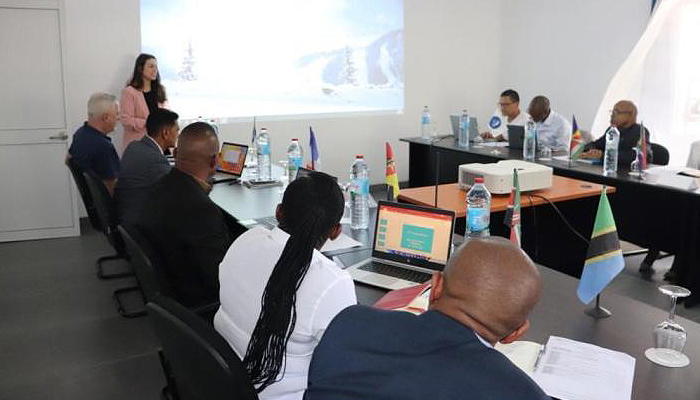As Sofia Biasin stepped onto the shores of Madagascar, she found herself at the crossroads of the world's most important sea routes. A young woman from Italy, Sofia has had what she describes as a remarkable experience as an international UN Volunteer Project Support Officer. Placed with the UN Office on Drugs and Crime (UNODC), she shares how she tackles the challenges of combating maritime crimes and trafficking in the Western Indian Ocean.
I have a background in human security and international cooperation and am interested in making the world a safer place. I have worked for international organizations and governments in Europe, Asia and Africa, and learnt to adapt to different environments.
In 2022, I became an international UN Volunteer for the Global Maritime Crime Programme (GMCP) of UNODC in Madagascar. It was an amazing opportunity to learn about how illegal activities affect a country's stability and understand maritime law enforcement.
As a project support officer, I assist the GMCP's Western Indian Ocean team in efforts to improve port security. I work with various actors involved in maritime law, such as governments, port authorities, legal experts and law enforcement representatives. This role allows me to travel across Madagascar and other countries and small island developing states (SIDS), including Angola, Comoros, Kenya, Mauritius, Mozambique, Namibia, Seychelles and Tanzania.
The Indian Ocean is the world's third largest ocean and has always been an important maritime space, connecting land and sea routes and hosting important ports. UNODC operates in this vast area, building partnerships and countering maritime crimes and illegal trafficking.
Unfortunately, the Western Indian Ocean has seen an increase in criminal activities in recent years, which has had negative effects on the countries in the region, including their domestic stability and economies of coastal communities.
Madagascar, as the largest island in the Indian Ocean, plays a central role in addressing these challenges. While the country is often known for its lemurs, vanilla plantations and beautiful beaches, it is also vulnerable to illicit activities due to its strategic location and valuable natural resources.
Through the Port Security and Safety of Navigation programme, funded by the European Union, UNODC is taking action to secure port infrastructure and enhance capabilities for combating crimes, with the aid of transcontinental networks. The focus of our Port Security programme is to build the capacity of port authorities through intensive trainings in collaboration with local law enforcement agencies.
Volunteers add value to our team by being the first to engage with local authorities in the field and to pave the ground for our experts to deliver their training events.--Jolien Abrams, UNODC Associate Programme Officer and Sofia’s supervisor.
In 2022, UNODC GMCP experts successfully held in-country training events for over 750 trainees at 15 locations, focusing on the link between law enforcement and prosecutors to ensure a legal finish of crimes in ports.

Bringing about transformation takes time, but sometimes we can see immediate results. These trainings have already had positive impacts.
For example, in July 2022, just one day after an intensive training concluded in Mahajanga, Madagascar, a joint team of officers who had attended the training intercepted the smuggling of 36 endangered radiated tortoises. The tortoises were being transported to Comoros to be further trafficked to the Asian continent.
Working on this programme has been rewarding. I've gained knowledge in a specialized field and acquired specific skills. I support strategic meetings, travel extensively in the region and meet frontline law enforcement personnel.
I'm proud to be part of the positive change happening in the maritime security sector, where more women are getting involved in a field that has traditionally been dominated by men. --Sofia Biasin, UN Volunteer Project Support Officer with UNODC, Madagascar.
My supervisor commends my role in engaging with local authorities and ensuring the smooth implementation of our projects in Madagascar and the region.
Sofia has both prepared and delivered on the ground support to several training activities in the field of port and maritime security in the Indian Ocean West Region. She has proven to be creative, proactive and driven, which has resulted in successful implementation of our projects in Madagascar and the region. --Jolien Abrams, UNODC Associate Programme Officer and Sofia’s supervisor
Although our country office in Madagascar officially opened in 2022, we have longstanding cooperation with the government and key stakeholders. We work at both the national and international levels to improve coordination among agencies in the region, aiming to enhance port governance and security. This, in turn, promotes legitimate economic activities and reduces opportunities for illegal trade.
Our efforts span across nine countries and SIDS: Angola, Comoros, Kenya, Madagascar, Mauritius, Mozambique, Namibia, Seychelles and Tanzania. We coordinate and share information, as well as promote good practices, to achieve our goals.
Coordinating and syncing efforts across different countries and offices is not easy. It requires a lot of time and energy to act as a bridge between teams that are geographically dispersed. To succeed in my role, I stay in constant communication not only with our country and regional offices scattered around the world, but also with a wide range of partners and stakeholders.


